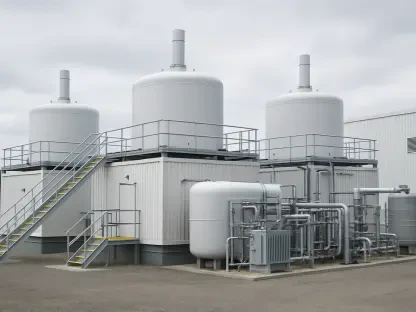As the construction industry in Colorado grapples with a severe labor shortage, driven by an aging workforce and insufficient new talent to fill the gap, a promising solution is emerging on the horizon with a growing movement to engage young women in construction roles. The sector, long dominated by men, faces a critical need for fresh recruits to sustain growth and meet infrastructure demands across the state. Amid this challenge, young women are being positioned as a vital force to address workforce deficits while shattering outdated gender norms. Through targeted initiatives, educational programs, and hands-on experiences, this shift not only promises to bolster the industry’s labor pool but also fosters inclusivity in a field ripe for transformation. The focus on empowering women through mentorship and exposure to practical skills underscores a broader cultural change, signaling that the future of construction may well depend on tapping into this underrepresented talent pool.
Breaking Barriers Through Hands-On Exposure
A pivotal effort to draw young women into construction is evident in events designed to spark interest and provide tangible experiences. One such initiative, hosted by the Transportation and Construction Girl organization, recently brought together around 2,000 girls, along with educators and parents, at the Jefferson County Fairgrounds. This annual gathering featured nearly 70 exhibitors demonstrating real-world skills, from mixing concrete to operating heavy machinery like excavators and cranes. The event serves as a powerful platform for young attendees to envision themselves in roles traditionally seen as male-only. By engaging directly with equipment and industry professionals, these girls gain confidence and a clearer understanding of the opportunities awaiting them. Beyond just exposure, the event challenges the misconception that construction is solely about physical strength, showing instead that determination and skill are the true requirements for success in the field.
Equally important is the mentorship and visibility of women already thriving in construction, which further inspires participants. Stories of professionals like Erica Sittloh, a project manager at a prominent firm and a rare female in her position, highlight the potential for career growth. Sittloh’s journey from an administrative role to managing complex projects illustrates that barriers can be overcome with perseverance and support. Her presence at such events offers a relatable role model for young women, proving that leadership positions are within reach. Additionally, the interactive nature of these gatherings allows attendees to ask questions and receive guidance from seasoned workers, demystifying the industry. This direct connection between aspiring talent and established professionals fosters a sense of possibility, encouraging more young women to consider construction as a viable and rewarding career path rather than an unattainable goal.
Challenging Stereotypes and Building Confidence
The notion that women are unsuited for construction work due to physical limitations is being dismantled through real-world examples and advocacy. Industry leaders like Keller Hayes, director of the Transportation and Construction Girl initiative, emphasize that with minor accommodations—such as additional steps or adjusted pedals—women can excel in any role, from driving cement trucks to managing job sites. This perspective is reinforced by the experiences of women operating heavy equipment with ease, proving that gender does not dictate competence. Such examples are crucial in shifting cultural perceptions, demonstrating that the industry values skill and adaptability over outdated stereotypes. By highlighting these success stories, the sector sends a clear message: construction is a field where women can thrive, provided they are given equal opportunities to learn and grow alongside their male counterparts.
Personal motivations also play a significant role in drawing young women to the industry, often fueled by family influences and early exposure. Take the case of 14-year-old Jasmine Martinez, whose interest was ignited by her grandmother’s work with heavy machinery at a major equipment company. Similarly, Chelsea Sewell, a mechanic at a leading firm, attributes her passion to growing up around her father, a heavy equipment operator. Sewell takes pride in repairing machinery and witnessing her contributions come to life on job sites, reflecting the deep fulfillment that comes from such work. These stories underscore how personal connections and role models can inspire young women to pursue nontraditional careers. They also highlight the importance of creating environments where girls feel supported and encouraged to explore fields historically outside their reach, ensuring that talent is nurtured from an early age.
Addressing Labor Needs with a Diverse Workforce
The push to recruit young women into construction isn’t merely about diversity for its own sake—it’s a pragmatic response to a dire labor shortage. Industry professionals note that companies are desperate for skilled workers, regardless of gender, and view women as an essential, untapped resource to meet growing demands. This necessity-driven approach is evident in the enthusiasm of young women like Ashley Livingston, a construction management senior at Colorado State University, who has already secured a job upon graduation. Raised in a household with brothers, Livingston feels at ease in male-dominated settings, reflecting a generational shift toward confidence and acceptance. Her story illustrates how educational programs and industry partnerships can prepare women for immediate entry into the workforce, helping to close the labor gap while fostering a more inclusive environment across construction sites.
Beyond individual success, the broader trend shows a growing cultural acceptance of women in construction, driven by both need and advocacy. Events and initiatives that connect young women with career opportunities are laying the groundwork for systemic change. The diversity of experiences—from elementary school girls trying out heavy equipment to seasoned professionals sharing their journeys—demonstrates a wide range of entry points and career paths available. This spectrum of engagement ensures that women at various stages of life can find a place in the industry, whether through apprenticeships, formal education, or on-the-job training. As more companies recognize the value of a diverse workforce, the focus shifts to creating supportive policies and workplaces that retain female talent, ensuring long-term impact on the industry’s labor challenges and overall growth.
Paving the Way for Future Growth
Reflecting on the strides made, it is evident that the construction industry in Colorado stands at a turning point where necessity intersects with opportunity. The efforts to engage young women through impactful events at venues like the Jefferson County Fairgrounds showcase a commitment to inclusivity that has begun to yield results. Stories of women who have risen through the ranks or found inspiration in family legacies paint a picture of progress that is both personal and collective. Looking ahead, the next steps involve scaling these initiatives, ensuring that mentorship programs and educational outreach expand to reach even more young talent. Industry leaders must also continue to advocate for workplace adjustments that make roles accessible to all, while schools and universities should integrate construction-related curricula to prepare the next generation. By building on the momentum of past efforts, the sector can create a sustainable pipeline of skilled workers, securing its future through diversity and innovation.









